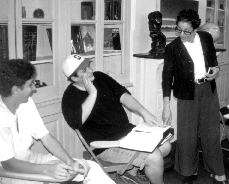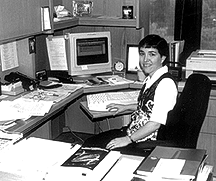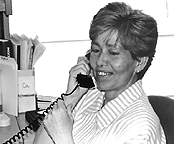
The whisper first surfaced while I was a graduate student at the University of Chicago, but I shooed away my doubts: everyone hates grad school, right? I stayed, I got a Ph.D., and I happily, idealistically, and naively left Illinois for a postdoctoral experience at Cornell's Medical College in White Plains, N.Y. That innocence faded over the next two years in a bloody, inch- by-inch battle that pitted the realities of bench research against my own Candidesque mindset. When my usual powers of rationalization-now considerably more sophisticated-proved ineffective, I stepped back, wrestled with reality, and lost. A critical catalyst came last Christmas in the form of a front-page article in The Washington Post about the difficulties facing up-and-coming Ph.D.s. That article articulated my doubts and from that moment on, my departure from the bench became only a question of time.
 |
To be certain, I could stomach the 80-hour work weeks that left time for little else. I could survive an increasingly lengthy and nomadic postdoctoral path to a tenure-track job. Once on the track, I considered it simply a necessary evil to write (i.e., "cut and paste") three to five grant proposals a year in hopes of snagging one grant. Continuing in this rationalizing vein, I looked into a future in which administrative responsibilities would begin to pull me away from the bench, but in which I could interpret that change as a sign that I had moved up and on. Besides, at that scientific echelon, I could justify spending less time on my teaching because everyone knows publishing is where it's at. If I still needed more time to catch up on my research, I could just take a sabbatical without leaving the lab. These musings made it clear to me that if I tenaciously clung to a life of research, I could only look forward to placating an uneasy conscience for years to come. Now, my commitment to science remains, but in a happily altered form.
When "get out" finally won over "stay in," I searched for positions that would blend my love of (and training in) things scientific with other unexploited skills. As a grad student and as a postdoc, I taught to supplement my meager monies and had liked it. Based on that experience, I contacted universities but came up empty-handed. Those refusals precipitated my decision to apply to private high schools. Private schools can hire a teacher without certification and, in my case, one did. I found a job teaching biology, chemistry, and psychology (my Ph.D. is in Biopsychology) at Emerson Preparatory Institute, which has a unique approach that meshes well with my own ideas about education. At Emerson, the oldest college prep school in the District of Columbia, students graduate in two years, not four; they spend 90 minutes in each class and none in extracurricular activities; and they are placed according to ability, not age. Like a hand in a well-worn glove, I slid easily into this next incarnation.
After spending the last few months teaching, I realize that I can do something for science that I've long felt needed doing: beefing up our public image. Scientists are an autonomous, solitary bunch immersed in terminologically tangled conversations. The language of science need not be translated in its entirety for the general public, but the core of scientific debate-the ideas that enliven a scientist's mind-should be. Research that explores scientific ideas is financially supported by the public, and to be supported, it must be appreciated, and to be appreciated, it must be understood. I've decided that classroom proselytizing furthers research as surely as a life spent in the lab. Fortunately, it also suits me better.
First, don't listen to people outside of the field in which you want to work when you're obtaining advice about the number of jobs or the ease of finding employment. After I started law school, all the other scientists I worked with kept telling me how I could "write my own ticket" after school. It was all bull*@#*. They didn't know any more about the legal job market than I know about the computer science job market. Talk to people who are employed in those fields of interest.
Second, start looking into that job market long before you graduate. Keep reading industry trade magazines and journals. Follow trends in the fields you are interested in. You may be surprised to find out that what was a hot field when you started has cooled considerably before you finish. Be prepared to change your ideas about what you want to do while you still can. Even if it is too late for that, you can rewrite your resume to skew it toward the more open employment fields.
Third, keep many different versions of your resume. Believe me, I know how painful it is to get just one perfect version, but you will need versions that emphasize certain aspects of your skills over others. Fourth, get someone in your chosen field to review your résumé. You will be surprised to find out what kind of important information yours is lacking. ...
Fifth, I adhere to the philosophy of sending out as many résumés as possible-both for advertised and nonadvertised positions. I must have sent out more than 100 résumés over a one-year period. For many, I never received even confirmation that the resume was received. I was asked to about a dozen interviews. They broke down evenly between employers who had advertised and those to whom I had mailed my résumé unsolicited. I received my offer from an advertised position posted at my school. Sixth, don't be surprised if the interviewer hasn't read your resume. About one-third of interviewers didn't know I had published any scientific papers or that I was a law journal editor, even though both credentials were plainly visible on my resume. Sometimes the interviewers had lost my resume. So, bring extra copies of your most recent publications and résumé to the interview.
Seventh, don't get discouraged when you get those wonderful little letters that say, "We had so many qualified candidates, it was hard to choose ... (i.e., not you). We're sure with your credentials you will find a position ... blah, blah ... ." Just consider each interview practice for the one job you will get.
Finally, don't be surprised if the real reason you don't land the job is because of personalities. I think this point has not been emphasized in previous employment posts. Most often, employers want a qualified person who can get along with everyone. You may be the brightest woman or man in the world, but if you act like it, no one is going to want you around. Be amiable during the interview. Show you have a life, hobbies, etc. Check out the employer's office as you sit there. Are there pictures of fish? Pets? Kids? Talk about those things near the end of your conversation. Does the office view employment the same way you do? If not, you will probably not get the job or be unhappy if you do. Remember, it is worse to get the wrong job than not get it.
This article was adapted with Contrera's permission from an electronic message originally posted on the Young Scientists' Network on Aug. 11, 1995.
I started scouring journals and newspapers for other job possibilities. One day in 1989, while looking through Science, I saw an ad for scientists willing to write occasional reviews of children's science books for Appraisal, Boston University's quarterly publication for librarians. Reviewers weren't paid, but they could keep the books. This seemed like a good opportunity to try my hand at writing about science for a lay audience as well as to get something published under my byline. I signed up and have been doing occasional book reviews ever since.
Next, in early 1991, came an ad for an editor position with The New Biologist, a basic cell and molecular biology journal based in Bethesda. The description of the ideal candidate fit me pretty well: Ph.D. biologist with broad interests, good writing skills, no editing experience necessary. So, after doing some research about the journal, I carefully crafted my cover letter and résumé and sent them off. To my delight, the managing editor and editor-in-chief soon called me in for an interview. The editors offered me the job that very day and gave me the upcoming three-day weekend to make my decision.
 |
That weekend, I sought advice from everyone I thought could provide insight. To leave the lab might well be an irreversible step. Did I really want to abandon a basic research career after spending so many years preparing for one? "You've been talking about going into science writing for years," my friends reminded me. "This is your chance to try it." I could always return to the lab after a year or two if I didn't like the job. By Monday, with a mixture of excitement and trepidation, I decided to take the plunge.
After breaking the news to my postdoc mentor, who was very understanding, and tying up some loose ends in the lab, I reported to work as meeting reviews editor. It turned out to be one of the best decisions I've made. I loved the job and my colleagues, several of whom had also started out in research. In the course of inviting researchers to write reviews of scientific meetings and of editing those reviews, I got to talk with many leading scientists and learn what was hot in a wide range of fields. I also attended and wrote about some meetings myself, including a memorable meeting on signal transduction held in a tiny village in the Swiss Alps.
After 10 months, my bubble burst. The journal was not doing well financially, and our publisher decided to fold it. My colleagues and I were given eight weeks notice and handed our severance packages. With the help of my managing editor, I began searching madly for a new job. Among the people I contacted was Anne Thomas, who is associate director for communications at NIH. At her suggestion, I spoke to public information officers at several NIH institutes. I began reading the weekly NIH job listings and applied for several writing positions.
Armed with my book reviews and reports on scientific meetings, I convinced NIH administrators to give me a chance at writing for lay audiences, despite my limited experience in this area. Once again, I have learned quite a bit on the job. My work in NIAMS's public information office includes writing about science for the nonscientist in various formats, such as news releases, articles, and congressional reports, as well as handling some public and media inquiries. I interact with intramural and extramural scientists and scientific administrators, as well as with reporters.
I enjoy doing my part to fill a great and growing need: bridging the gap between scientists and the general public. I also enjoy learning about new areas of research as I write about a wide range of topics. My broad science education and research experience have served me well in being able to communicate with researchers and translate what they do into lay terms. Last year, I became deputy director of the office, which means taking on more managerial and editorial duties. However, I still get to do what I like best-learning and writing about biomedical research.
My advice to anyone considering a science writing career is to talk with science writers, such as people in your institute's communications office or members of the D.C. Science Writers' Association and the American Medical Writers' Association. It's also valuable to get some writing experience, even if it's only a letter to the editor about a scientific issue. This shows that you're serious about writing and provides you with published samples for prospective employers. Look for writing internships if you can afford the time and low pay, or take a science writing course or general journalism class.
There clearly is, and will continue to be, a need for people who understand science and can explain it in terms that nonscientists can understand. Although I will always miss some aspects of doing research, I know that, for me, the decision to leave the lab and pursue a less traditional career path was the right one.
"To my way of thinking, my growth was limited. Some people are wedded to the lab, bench work, and actually doing research. But I always had a broad vision ... I wanted to move on and over to a different type of creative neuronal activity," says McGowan, who, 12 years after getting her Ph.D., decided to leave the lab to become a scientific administrator at NIH.
Although it may have seemed like a rash move to her scientific colleagues, McGowan had been working up to the transition for some time. At Mass General, she sat on boards that reviewed grant applications going out to NIH and acted as an adviser to the director of internally sponsored research at the teaching hospital. The idea of becoming an administrator intrigued her even more after she served on NIH study sections and interacted with administrators who oversaw extramural grants. Then in 1989, McGowan took the leap-moving to Bethesda and enrolling in the Office of Extramural Program's Grants Associate Program, a one-year training program established more than three decades ago to help scientists make the shift from bench research to extramural administration. In addition to course work, the grants associates rotate through assignments among the 22 extramural divisions at NIH.
 |
Eventually, McGowan moved through the extramural administrative ranks to become director of the Musculoskeletal Diseases Branch at NIAMS. "In writing and talking to researchers, I think I am a much more valuable contributor to science than I was as a participant," McGowan says. "I feel like I have blossomed by getting the opportunity to do this." At the same time, McGowan says she hasn't missed the lab. "I never wake up in the morning and wish that I was injecting a rat that day or running a gel."
McGowan says her years of bench research, writing grants, and publishing papers are not wasted. "I really do know the strains and how important each grant application is in the life of the investigator. That's often a lot more important than having a background in their specific field. I know what it's like to be on the front lines."
Although administration may lack the pizazz of other research career pathways, McGowan says some of her colleagues from the lab express a bit of envy when they see how much she enjoys her job. And, she chuckles, some of them have even started asking, "Now, exactly how did you get to do what you're doing?" Unfortunately, it may be difficult to duplicate McGowan's exact steps at the moment. Although there are currently three grants associates at NIH, the program is accepting no new applicants this year and its future is in limbo due to the federal downsizing mandate, says James O'Donnell, the program's director.